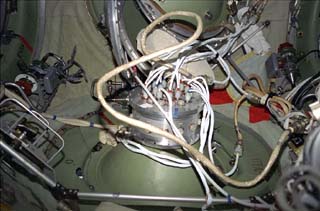


In his Oral History, NASA astronaut Charles Precourt describes the effects of the collision between the Mir space station and an unmanned Progress supply vehicle.
He says, "When I went back up on STS-91 and saw that the Spektr had been totally sealed off . . . due to the leak, we did a little procedure to pressurize it, in hopes that we'd see [fluorescent] gas coming out of the base of the [damaged] solar array.
The procedure did not work. Precourt says, " Unfortunately, there was not enough of a leak . . . to see anything, but it was a good attempt . . . to develop a technique for finding leaks . . . on the International Space Station.
Precourt goes on to describe the post-collision Mir. "Other than the fact this [Spektr] module was sealed off, the condition of the inside of the space station was better than it was on my previous two visits. The air was cleaner. It was better controlled temperature. It was drier. The walls of the surfaces of the structure everywhere were nice and dry. There had been lots of humidity on my previous two visits that was evident everywhere."
Related
Links:
The
Collision
Charles
Precourt Oral History (PDF)
Foale Increment
![]()
|
|
Curator:
Kim Dismukes
Responsible NASA Official: John Ira Petty |
.gif)